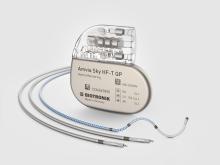Five Things All Cardiac Device Patients Should Know
Read the Most Common Patient Questions We Received in 2021 and Answers From Our Experts

Every month, our dedicated Patient and Technical Services Team in Berlin handles hundreds of enquiries from BIOTRONIK patients in German-speaking countries—in close cooperation with colleagues around the world who answer questions from patients in their respective countries and regions. This way, we make sure that every patient gets an answer in a language they speak, with information that’s relevant to them. Questions come in from all over on a range of topics, and although some are more specific to a particular device or place, many patients have similar enquiries— no matter where in the world they’re from.
“We’re seeing two big trends,” says Jacqueline Brunn of BIOTRONIK’s Patient and Technical Services Team in Berlin. “Firstly, as technology evolves and our lives become more digital, patient questions tend to focus more on technical and data-specific aspects as well. More than ever, we’re surrounded by wireless data and interconnected devices. So it’s no surprise that our patients are curious about how their medical devices relate to these devices, whether they have smartwatches, iPhones, or smart household appliances. We’re seeing more questions about smartphone and smartwatch compatibility with implants, for example. That’s obviously something that’s very new in the last few years,” explains Jacqueline. MRI capability is also a common area of concern, with Jacqueline adding that “we get MRI questions every day.”
“Patients are also using their digital opportunities to inform themselves more autonomously,” she says. This is a trend that recent research data confirms. Patients are increasingly seeking health and lifestyle information online—including by checking ‘Dr. Google’. Patient expert Jacqueline confirms this data: “I talk to many patients who do their own research first. They contact us when they need more detailed, but also more reliable and trustworthy information. We are proud to be an established global medical company with expertise and knowledge that patients can and do trust.”
With all that said, exactly which questions were top of mind for BIOTRONIK patients in 2021?
Check out our list of the most common questions sent to Jacqueline’s team over the last year:
I Got a Pacemaker a Few Months Ago. I Want to Do Sports Again and Would Like to Use a Heart Rate Monitor. Can I Do That, or Does This Interfere With the Implant?
Heart rate monitors are safe for BIOTRONIK implantable pacemakers and defibrillators when used as intended. Always observe the watch manufacturer’s instructions and make sure it has no direct contact with your implant.
Am I Allowed to Visit a Sauna With My Implant?
From a technical point of view, nothing speaks against visiting the sauna. Nevertheless, please ask your doctor whether he or she has any concerns from a medical point of view.
I Have to Undergo an MRI Scan. Is My Pacemaker Suitable for This?
In order to check whether your implant system is MRI-compatible, make sure you have both the names and serial numbers of both your implant and electrodes. If your combination of pacemaker / ICD and electrodes is MRI-compatible, you can undergo an MRI scan if certain conditions are met such as the use of an MRI scanner with a closed bore and a certain static magnet field. If these conditions are met, your cardiologist will program your device into a specially-designed MRI mode beforehand.
I Have a Pacemaker / Icd From Biotronik, Can I Keep Using My Induction Cooker or What Do I Have to Consider?
If used as intended, you can use an induction cooker as long as it stays at least 30 cm from your implant. Please follow the instructions of the stove manufacturer accordingly. If, for example, the manufacturer has advice on how the stove should be used by implant patients, the manufacturer's notes should replace our recommendation.
I Have a Body Fat Analyzer. Can I Continue to Use It With My Implant?
Implant patients must not use body fat scales, as this runs the risk of significantly impairing implant functions.
Do you have a specific question that isn’t answered here? “We recommend that you first speak to your doctor for urgent medical and/or therapy-related questions,” says Jacqueline. “We encourage patients and their family members to also consult the information we provide in our online patient section.”











